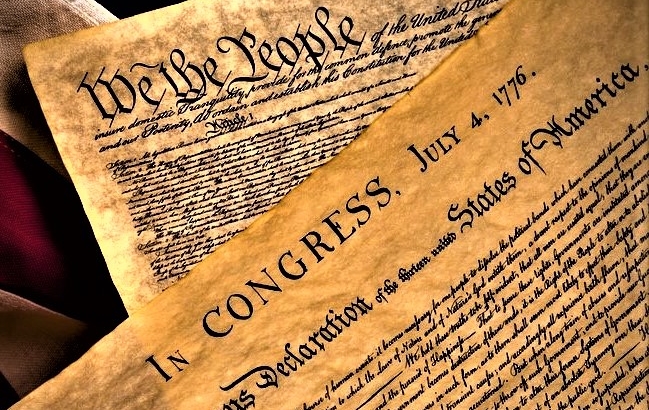Principle of Decision Making by the Majority Within a Constitutional Framework
 Essay Read by Constituting America Founder, Actress Janine Turner
Essay Read by Constituting America Founder, Actress Janine Turner
In a republic, it is common to refer to government action needing to be supported by the consent of the people. But what do we mean by the “people?” Certainly, this cannot mean the consent of every person in a political community since no such universal consent would ever be possible. Instead, a republican form of government relies on the consent of the majority in undertaking action and carrying out public policy. This does not mean that the will of the majority is always right or just or that the majority cannot be tyrannical in how it exercises its will. There is no question that majorities can be as despotic as kings if given the ability to rule unchecked. The majority will, however, properly organized, limited, and directed within a constitutional framework will generally prove the most legitimate basis for good government.
No one makes this argument more effectively than James Madison, the architect of the large republic that can operate over a broad territory with a big population. This model, presented in Federalist 10, became the basis for the American idea of republicanism. In doing so, Madison argued that majority rule was not perfect, but it was better than any of the available alternatives. Majority rule is what allowed republican government to exist and what further allowed rule by the people. In short, the principle of majority rule is the basis of popular sovereignty and is tempered and moderated through the institutions of constitutional government. To be sure, not everyone agreed with Madison’s defense of majority rule. Some, like Thomas Jefferson, complained that rule by the majority left the rights of the minority insecure and presented the minority with few options in protecting their rights and liberties. A perfect example of this was the Alien and Sedition Acts passed in 1798, which restricted immigration and speech in the United States.
Jefferson was called on to help prepare a protest against the acts, which he did in the famous Kentucky Resolutions. In the Resolutions, Jefferson argued for a narrow reading of the Constitution and embraced a states’ rights interpretation of the constitutional system. His major concern, though, was how the minority could protect itself from the majority within the constitutional system. His solution was to embrace the doctrine of state nullification. As Jefferson explained, “where powers are assumed which have not been delegated, a nullification of the act is the rightful remedy; that every State has a natural right in cases not within the compact, to nullify of their own authority all assumptions of power by others within their limits.” Clearly, this was quite a radical doctrine and had important implications for the young republic. A number of prominent statesmen spoke out against Jefferson’s idea and predicted that nullification would become the death knell of the nation. In that they were not far wrong. Madison, for his part, helped prepare an alternative set of resolutions for Virginia, but was much less radical and said nothing about a power of nullification to protect the minority. The Alien and Sedition Acts showed that the majority’s will could sometimes be in error, but it was still the best way of organizing the voice of the people.
The challenge of nullification to the principle of majority rule came up again in 1832 when South Carolina nullified two tariff bills that it claimed were unconstitutional. Under the heavy influence of John Calhoun, South Carolina’s Nullification Proclamation announced that the acts “are unauthorized by the constitution of the United States, and violate the true meaning and intent thereof and are null, void, and no law, nor binding upon this State, its officers or citizens.” According to Calhoun and South Carolina, every state had the right to judge for itself the constitutionality of the laws of the country and to negate those laws if a state believed them to be unconstitutional. This was the only way of protecting the minority against the overreach of the majority and to make sure that minority rights and interests are taken into account.
But the nullifiers’ claims did not stop there. Backing up their doctrine of nullification was an appeal to secession. The Proclamation warned the national government that any attempt to change South Carolina’s nullification by force would leave the state with no choice but to leave the Union. An act of aggression against the state would be
“inconsistent with the longer continuance of South Carolina in the Union; and that the people of this State will henceforth hold themselves absolved from all further obligation to maintain or preserve their political connection with the people of the other States; and will forthwith proceed to organize a separate government, and do all other acts and things which sovereign and independent States may of right do.”
Eventually, South Carolina backed down on nullification, but the fact it had been raised again speaks to what a powerful challenge it was to the principle of majority rule. It is for this reason that Madison as an elder statesman prepared a response to Calhoun and a defense of majority rule. In 1833, Madison wrote in a letter that articulated his strong position on majority rule and how the extended republic makes majority rule possible and safe. As Madison wrote,
“Those who framed and ratified the Constitution believed that as power was less likely to be abused by majorities in representative governments than in democracies…and less likely in the larger than in the smaller communities, under a representative government, inferred also, that by dividing the powers of Government and thereby enlarging the practicable sphere of Government, unjust majorities would be formed with still more difficulty.”
To men like Calhoun, and Jefferson, who would attack majority rule, Madison put the matter plain. Without majority rule, republican government was simply not possible. This made it clear that “while the Constitution is in force, the power created by it [in a popular majority] must be the legitimate power, and obeyed as the only alternative to the dissolution of all government.” Thus, it is, according to Madison, that majority rule under constitutional government is not to be preferred because it is perfect, but because it is the least imperfect.
 Eric C. Sands is Associate Professor of Political Science and International Affairs at Berry College. He has written a book on Abraham Lincoln and edited a second volume on political parties. His teaching and research interests focus on constitutional law, American political thought, the founding, the Civil War and Reconstruction, and political parties.
Eric C. Sands is Associate Professor of Political Science and International Affairs at Berry College. He has written a book on Abraham Lincoln and edited a second volume on political parties. His teaching and research interests focus on constitutional law, American political thought, the founding, the Civil War and Reconstruction, and political parties.
Click here for First Principles of the American Founding 90-Day Study Schedule.
Click here to receive our Daily 90-Day Study Essay emailed directly to your inbox.




Join the discussion! Post your comments below.
Your feedback and insights are welcome.Feel free to contribute!